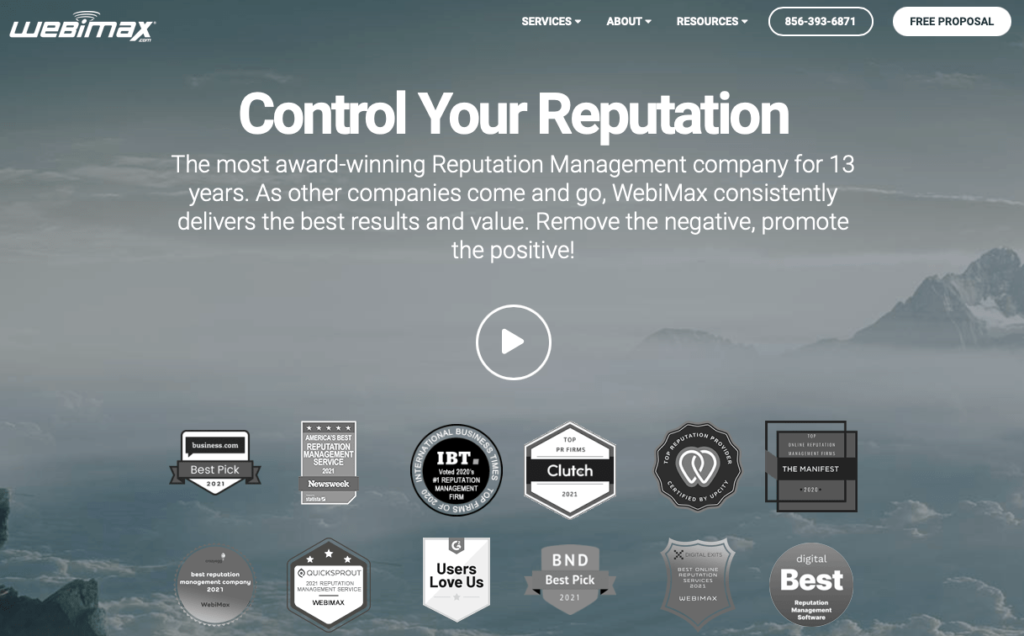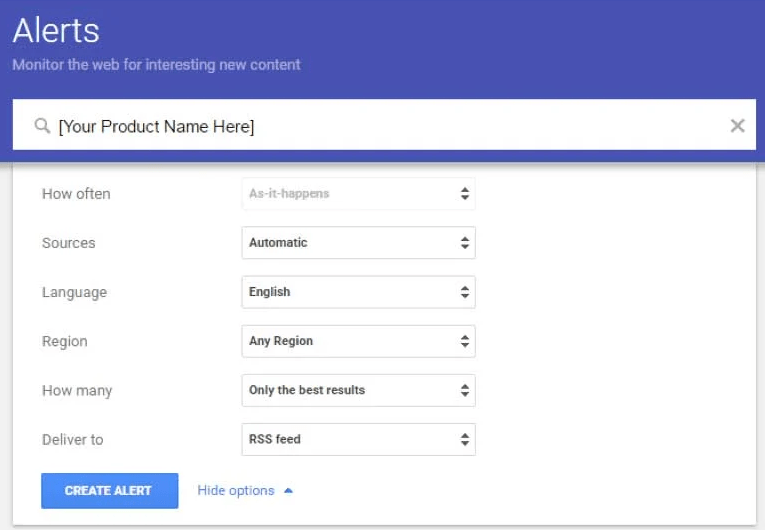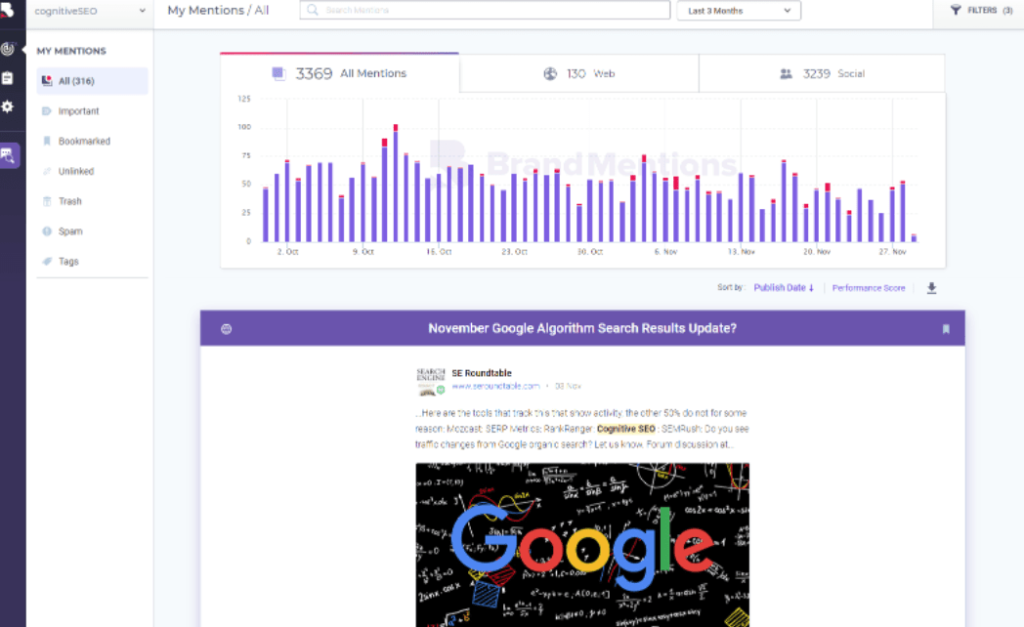The Beginner’s Guide to the Best Strategies to Manage Your Online Reputation

Want to just get started? Click here to sign up for WebiMax and start managing your online reputation today.
You’re bound to receive negative press when you’re a public-facing company. What matters is how you respond to bad reviews and unfavorable news articles.
The internet remembers things forever, so you must act quickly to right wrongs and restore your online reputation. In this guide, we’ll show you how to actively protect and manage your online reputation.
What is Online Reputation Management?
Online Reputation Management (ORM) refers to a set of actions to control the online conversation about an individual, brand, or organization. These actions often include monitoring, analyzing, addressing, and leading the online discussion in a positive direction.
Generally, online reputation management efforts may cover multiple digital touchpoints, including:
- Social media platforms
- Videos
- Review sites
- Press coverage
- Websites such as blogs and news sites
Successful ORM offers multiple benefits, including improving brand credibility, building trust, increasing web traffic, and reacting quickly to potential crises.
Deciding How to Handle Online Reputation Management
Online reputation management is an ongoing initiative that requires lots of time and expertise. This isn’t something you can focus on for a couple of months and then just put on the back burner for the rest of the year.
Some brands like to handle online reputation management in-house. But not everyone has the time or internal resources to devote the effort required to do this correctly.
That’s why so many organizations work with an online reputation management company to handle things on their behalf. The best online reputation management companies can customize services based on your unique needs and goals.
For example, a startup that wants to build a new reputation from scratch won’t have the same needs as an established business dealing with bad PR. Some companies may need help getting more reviews for their products and services. Others may need help responding to negative reviews or removing negative content from the web.
Our top recommendation for most people is WebiMax. They can solve current issues quickly and provide guidance to keep your reputation spotless moving forward.
Obtaining Other Services
When you’re looking to outsource services or work with a new agency, it’s natural to consider bundling as many services as possible under one roof. It’s much easier to manage a single vendor that provides five services instead of managing five vendors that each provide something different.
It’s very common to see online reputation management companies offer additional services beyond the scope of ORM. This may include PPC marketing, web design, social media advertising, and more.
Just be cautious here as you’re evaluating different options. Based on our experience, it’s rare for agencies to be really good at multiple services that fall within different areas of expertise.
Not every online reputation management company will be the best option for web development or advertising strategy. In some cases, it may be better to stick with an agency’s core service instead of signing up for everything they offer. But some of you may appreciate the option to get everything from a single provider.
It’s also worth mentioning that you don’t need to make this decision today. You can always start with a company’s online reputation management service and see how it goes before you use them for something else. If they get to know your brand and deliver the results you’re looking for, then you might feel more comfortable adding another service to your contract.
The Basics of Online Reputation Management
The particulars of online reputation management may vary depending on the organization and its ORM goals. However, the process is typically concerned with three fundamentals:
Reputation Monitoring

Every brand has ideas about how it would like to be perceived online. But it’s difficult to shape that narrative when you don’t know what people think of you in the first place. Reputation monitoring can help you understand what people are saying so you can come up with a specific action plan to steer the conversation in the desired direction.
Online reputation monitoring may be manual, automated, or hybrid. For instance, an employee may be tasked with daily monitoring and reporting on the organization’s social media and relevant review sites. On the other hand, online monitoring tools automatically crawl your social media accounts and report the results to an administrator.
Examples of good online reputation monitoring tools include Google Alerts, Semrush, and BuzzSumo. Other places to monitor your reputation may include ads, blogs, search results rankings, and relevant press.
Reputation Repair
Inevitably, reputation monitoring will uncover at least some harmful content. These types of content may include negative news articles and negative reviews on review sites. However, the information doesn’t even have to be true to damage your reputation.
Successful ORM should suppress the negative content and promote brand-affirming positive content. Common reputation repair tasks may include:
- Owning up to mistakes
- Increasing a positive online presence
- Taking down negative content
- Pushing down negative search results
- Responding to negative reviews
- Increasing online engagement
- Continuous reputation monitoring
Most of the reputation management companies we listed earlier also offer professional repair services. You may want to hire a professional to manage this stage of your reputation management. For instance, review sites like Yelp offer one chance to make a case for why your negative review should be taken down. A professional will have a much better chance of making this case on your behalf.
Reputation Building
Reputation monitoring is passive, while reputation repair is reactive. Therefore, you need a proactive element to manage your online reputation, which comes from reputation building. This process involves actively building the online image you’d like to portray.
Depending on your strategy, online reputation building can take various forms, including:
- Designing a user-friendly website
- Sharing achievements and awards
- Expanding your online presence
- Building social media engagement
- Creating an online review strategy
- Partnering with reputable influencers
- Delivering on your promises
This element of managing your online reputation is arguably the hardest and takes the most time. However, the ROI from a solid strategy can make the process worth it. Again, some reputation management companies we mentioned earlier offer reputation-building services.
Ways to Improve Your Online Reputation Management Strategy
It’s worth exploring a few tools and services that can make it easier to implement your reputation management strategy.
WebiMax

WebiMax is a digital marketing agency with deep experience in online reputation management. They can help your business show up in search results and maintain a positive image. Some of their reputation management services include:
- Identifying and deleting harmful content
- Suppressing harmful search results
- Creating new positive content to outrank negative content
- Leveraging your unclaimed profiles to boost your online presence
You don’t have to be the expert if you work with WebiMax. They offer a free analysis of your reputation before creating a customized strategy around your specific needs.
Google Alerts
Not everyone has the budget or appetite for outsourcing your online reputation management. At the very least, you should sign up for Google Alerts, which offers a host of free tools and features to help you with your strategy.

Some of the things you can do with Google Alerts include:
- Monitoring your brand name
- Keeping track of media mentions
- Understanding market trends
- Keeping an eye on your competitors
Google Alerts is an excellent tool if you’re just starting with ORM. However, you might soon outgrow its features and require a more robust tool like BuzzSumo or Semrush.
A Reputation Management Plan
After the initial reputation monitoring or audit, it’s easy to get lost in the different metrics you need to address. So a solid reputation management plan will help you prioritize your action steps. The best place to start is with clear and specific goals for what you want your ORM to achieve.
Some examples of specific ORM goals may include:
- Removing or downplaying negative listings
- Strengthening and promoting a positive online image
- Defending your brand from unscrupulous or deceitful persons
Then, you can prioritize your remediation, starting with the reputation damage with the most significant negative impact on your brand. Similarly, prioritize your actions based on their result and outcome.
5 Tricks for Managing Your Online Reputation
The online landscape has changed the way businesses interact with customers. Today’s consumer has a loud voice that can impact your business for better or for worse. Therefore, online reputation management should be a priority for the discerning business owner.
Below are a few things you can do to take control of your online brand image.
Be Proactive
Many businesses are passive or reactive when it comes to their online reputation. These businesses don’t play an active role in forming their online reputation and only act when there’s a crisis, such as a scathing news article or a flood of negative reviews. Usually, it’s too late to repair the damage by this point.
Taking control of your online brand image makes it easier to deal with the occasional negative review or bad press. For instance, a negative news article may be outranked by your high-performing and optimized content on search engine results.
You can start with an online reputation audit to determine what your audiences see when they search your business. Simply searching your brand on major search engines can reveal a lot about the information people are sharing about your business. An online reputation management company like Webimax can also help you perform the audit.
Next, take active control of the channels that contribute to your online reputation, including:
- Owned Media – Owned media makes it easy to control what people see about your business. Examples of owned media include your business website and blog. A high-quality website and updated blog can help improve your online reputation.
- Shared Media – Shared media like Facebook or Twitter allows you to engage your customers directly. These channels help create meaningful, engaging, and beneficial conversations with your audiences.
- Paid Media – Options such as social media ads and sponsored posts allow you direct control of your message and branding. You can also engage with your audience where they spend most of their time.
In short, a well-curated and solid initial online presence gives you more control over the top search results. This way, negative reviews might not cause significant damage. At the very least, the negative press will be easier to deal with.
Monitor Your Brand Mentions
Monitoring your brand mentions is an easy but effective way of staying on top of your online reputation. Ideally, you want to know about potentially damaging comments or mentions before they cause significant damage. Plus, you don’t have to spend all day on social media manually checking what people are saying about your brand.
Tools like Google Alerts, Semrush, Social Mention, and Tweet Alarm can help you automate the process. These tools continuously crawl the web for your chosen keywords. Then you’ll receive an alert any time there’s a new comment or review about your business.

However, monitoring your brand mentions shouldn’t be a passive process. You’ll need to act quickly and within the context of your mentions. Some of the things you can do in this case include:
- Ask websites that mention you to have a backlink to your domain.
- Solve emerging user problems quickly
- Use positive content in your marketing material, such as landing pages or email letters.
- Partner with credible influencers who mention your business.
Increase Positive Reviews
Unhappy clients don’t need to be coaxed to leave a review. Plus, unhappy customers are far more likely to leave a review than happy customers. So it doesn’t even matter if the negative reviews are unfair or false. They’ll still hurt your business.
You’ll need to be proactive about collecting positive reviews. Many clients are happy to leave a review if you ask subtly and nicely. However, make sure that the clients are satisfied with your product or service before asking them to leave a review.
Other strategies that you can use to garner more positive reviews include:
- Include subtle pop-ups to your website asking clients to leave a review.
- Reach out to your customers on social media.
- Add a review request to your email signature.
- Incentivize your customers to leave a review. Just be mindful of Google’s guidelines.
If successful, the positive reviews will outweigh the negative ones. Additionally, Google algorithms prefer brands with good customer relationships, which can help boost your brand on the search engine results page (SERP). Finally, the outflow of positive reviews will encourage more people to interact with your brand or business.
Learn to Deal with Negative Reviews
You have to learn to deal with negative reviews. They’re inevitable. As a rule of thumb, avoid deleting bad reviews. Instead, come up with a policy to address negative comments.
The best strategies for dealing with negative reviews include:
- Be courteous and thank the client for their review.
- View things from the client’s perspective.
- Respond quickly but thoughtfully.
- Acknowledge the review but offer to continue with the conversation offline.
- Follow up with the customer to ensure they’re satisfied with the outcome.
You might be surprised at the difference having an effective strategy for dealing with negative reviews can make. Many unhappy customers are willing to change or take down their negative reviews if you’re empathetic, transparent, and polite.
Improve Your Search Engine Optimization (SEO)
Effective search engine optimization might be the silver bullet you need to boost your online reputation. A well-planned and executed SEO strategy gives you control over the content that appears on the first page of search engine results.
You can deliberately streamline your SEO strategy to support your online reputation management goals. For example, authentic and concise content helps you attract backlinks from credible websites.
This way, your content ranks high on SERPs and links back to other credible brands. It’s a simple way of dominating the most visible search engine pages. So naturally, subsequent negative reviews or content are likely relegated to the second or third pages, where they are less visible.
Examples of this kind of content include:
- Guides and tutorial articles.
- Video reviews of your product, company, or industry.
- Your brand’s website and press page.
- Brand or author pages on authority publications.
- Whitepapers.
This strategy alone can help to push down unflattering content. It’s a slow and tedious process but is ultimately worthwhile.
Similarly, claiming your social profile lets you control what your audience finds about your business. Again, Google My Business is critical. Your listing is likely to appear at the top of the search results when people search for your brand.
Equally, your social media profiles will also likely appear on search results. These include Facebook, Twitter, and LinkedIn. Again, it’s better to control the messaging, branding, and content on these profiles.
Finally, it’s worth enlisting the help of an SEO expert to develop a long-term strategy for dominating the result pages for your industry, brand, and target keywords.
Managing Your Online Reputation: Your Top Questions Answered
What to Do Next
The first thing you need to do is decide how you want people to perceive your brand online. For example, some might want to be known for exceptional customer service, while others may want to be perceived as industry leaders.
Next, take charge of all your digital assets and profiles to help with your SEO reputation management strategies. Create a website and pages on all relevant social media channels. Make sure you claim all of your business profiles on third-party review sites as well.
Getting help from a company like WebiMax will make your life much easier as you’re going through this process. You can also check out my reviews of the top online reputation management companies for alternative options.